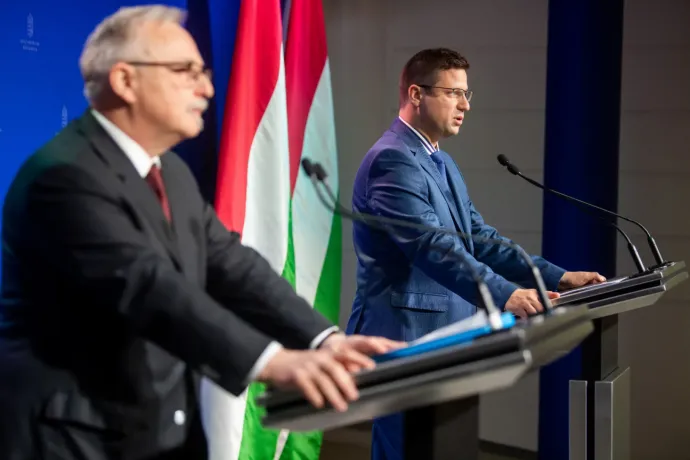The end of the fuel price cap

As of Tuesday evening at 11 pm, the fuel price caps that the Hungarian government introduced 13 months ago are not in effect. From now on, car owners will have to pay HUF 641 (1.56 euro) for a liter of regular fuel, and HUF 699 (1.70 euro) for a liter of Diesel.
This was announced at a government press briefing which began at 10.30 pm on Tuesday, a mere half an hour prior to the measure going into effect. The briefing itself had been announced less than 2 hours before, with just 14 minutes available to editorial offices for registration. Given the very late notice, the number of those present was surprisingly high, according to our colleague.
The announcement was made by Gergely Gulyás, Minister at the Prime Minister’s Office and Zsolt Hernádi, head of MOL, the Hungarian Oil Company.
“What we have been dreading has now happened. The EU oil sanctions, which came into force on Monday, have caused disruptions in Hungary's fuel supply for all to see”
-Gulyás said.
On Monday, MOL informed the Minister of Energy that it could not meet the country's fuel needs without imports. "It is the result of the Brussels sanctions that we can no longer provide Hungarian families with petrol at HUF 480/liter at the country's petrol stations. Therefore, two days after the oil sanctions were introduced, the government, following MOL's proposal, is lifting the price cap on gasoline," Gulyás announced.
Zsolt Hernádi explained that “a quarter of the gas stations were completely emptied. Supplying fuel has become extraordinarily problematic. Nothing like this has ever happened since MOL has been operating. The queues at the filling stations were reminiscent of the 1970s and 1980s. The turnover of the past few days was almost double that of the same time last year. There were 871 wholesale orders that we were not able to fill. The situation became critical, we hit a wall. This is as far as MOL was able to go" Hernádi said.
What does the future hold?
The MOL CEO said that most of the petrol missing from production had been transferred from Slovakia in recent weeks. But the only solution to the fuel shortage and the logistical problems is import.
In two months' time we will face another critical situation, according to Hernádi. By then, the impact of EU sanctions will be felt in Hungary as well. According to him, after 5 February, 10 percent of the diesel supply will be missing from the European market.
Gergely Gulyás explained that although Hungary is exempt from the EU oil sanctions, since it needs to import fuel, the country is also affected. The sanctions will reduce the European market by 10 percent, and this in itself poses a security of supply issue. He pointed out that even though we are exempted, the sanctioning of Russian oil will affect the Hungarian fuel supply. According to the minister, the price of fuel has skyrocketed because of the Russian aggression in Ukraine and the EU sanctions imposed on Russia in response.
Answering a question from hvg.hu, the minister admitted that abolishing the price cap will indeed raise inflation, and added that the government had counted on that. To what extent this will happen depends on the development of petrol prices.
When asked how this will affect the other price caps, Gulyás said that “All price caps make sense as long as they do not lead to product shortages”.
Telex asked who in the government was responsible for such a critical situation occurring in the country’s fuel supply.
In response, Gergely Gulyás said that “the citizens of the country are able to evaluate the past year as a whole. If one has to measure the difficulties of the last few days against the low prices of the previous 13 months, the answer is clear. When we start paying market prices from tomorrow, we will see how great it was to have been able to fill up so cheaply”.
For more quick, accurate and impartial news from and about Hungary, subscribe to the Telex English newsletter!